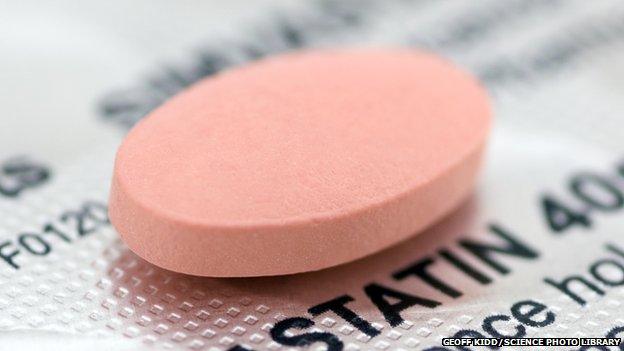Guidelines call for more people to be put on statins
- Published

Millions more people should be put on cholesterol-lowering statin drugs to protect them against heart attacks and strokes, according to draft guidelines for the NHS in England.
The National Institute for Health and Care Excellence, external (NICE) says the scope for offering this treatment should be widened to save more lives.
Death rates have been decreasing in recent years, but cardiovascular disease remains the leading UK killer.
It claims about 180,000 lives a year.
Currently, doctors are meant to offer statin tablets to the estimated seven million people who have a 20% chance of developing cardiovascular disease over 10 years, based on risk factors such as their age, sex, whether they smoke and what they weigh.
NICE is now suggesting that people with as low as a one in 10 or 10% risk should be offered statins.
Doctors will need to "make a judgement" about the risks to people who have a less than 10% risk of developing cardiovascular disease and advise them appropriately, say the draft guidelines.
The NHS currently spends about £450m a year on statins. If the draft recommendations go ahead, this bill will increase substantially, although the drugs have become significantly cheaper over the years.
It is not clear precisely how many more people would be eligible for statin therapy than now, but NICE says it could be many hundreds of thousands or millions.
Prof Peter Weissberg, of the British Heart Foundation, said the guidelines did need updating and agreed that more people stood to benefit from taking statins.
Former GP Dr Kailash Chand: "Statins should be used judiciously. Where they are needed. Not for healthy people"
Cardiovascular disease develops when fatty substances build up in the arteries and narrow them, which can lead to heart attacks and stroke.
Too much cholesterol in the blood can lead to these fatty deposits. Statin drugs work by lowering cholesterol.
Eating a healthy diet, doing regular exercise and keeping slim will also help lower cholesterol.
Like all medicines, statins have potential side-effects.
They have been linked to muscle, liver and kidney problems, but only in a very small number of cases.
Prof Simon Maxwell, of the British Pharmacological Society, said: "Patients should be helped to make a truly informed decision about the benefits and risks of taking long-term preventative therapy that will not make them feel any better in the short term.
"We should avoid misapplication of such a recommendation without proper individual patient counselling."
- Published17 May 2012
- Published19 January 2011